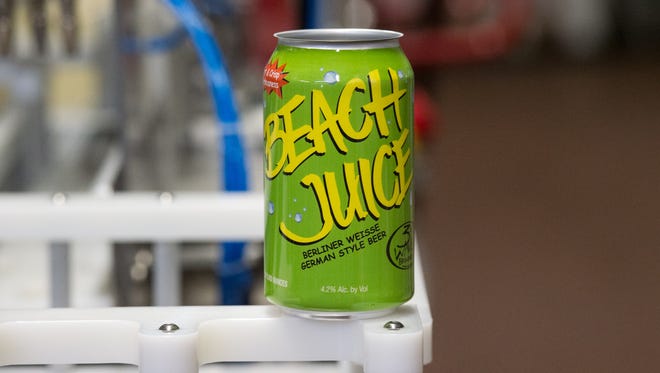A 1st for 3rd Wave Brewing: Getting into the canning business
 Jeremy Cox
Jeremy CoxAt 3rd Wave Brewing, it's hard to miss the can-do spirit.
After more than five years in business, the Delmar craft brewery is getting out of the bottling business for the most part. From now on, with the exception of a specialty brew here and there, co-owner Lori Clough said the only way consumers will find her beers on store shelves will be in aluminum cans.
Don't look so surprised, beer snobs.
Once the last bastion of cheap pilsners, aluminum cans have become the darling of the craft beer industry in recent years.
Technological advances and evolving consumer tastes have led to the rapid adoption of the formerly lowly can in the craft marketplace. Cans accounted for one out of six sales in the sector last year, up from about one out of 20 four years ago, according to the market research group IRI.
The can's reintroduction was fully realized in 2013, when Samuel Adams, an industry behemoth and bellwether, issued its first line of cans in its three-decade history.

Clough's brewery is no Samuel Adams in terms of size. But when she ran the numbers not long ago, she realized she could save money in the long run by investing $130,000 in a canning machine.
"We're very excited," she said Wednesday morning inside the brewery's tasting room, which is large enough for a bar, a row of stools and little else. "We tried that machine out last Wednesday (May 10), and it was like magic."
The machine can fill 40 cans a minute. The now-idled bottling line could ramp up to only 11 finished bottles in the same amount of time. In Clough's industry, getting more product in containers equals money saved.
Another benefit: Cans are accepted in a wider variety of settings than glass bottles, particularly on Delmarva. Retail sales in the Delaware and Maryland beach communities represent a huge chunk of 3rd Wave's business, but glass containers are specifically prohibited on many beaches and around hotel swimming pools.

"Definitely, where you're located is going to dictate a lot of what you do" as a brewery, Clough said.
A coastal vibe infuses much of the brewery's marketing and beer styling. The name, for instance, refers to the way waves ripple onto shore in "sets." Surfers prefer to wait for the "third wave" for the best ride, Clough said.
The brewery has made a niche with summer beers — lighter brews with a tart taste or fruity flavoring. The first beer to roll off the canning line was its Sand Storm brew, a Belgian tripel.

BACKGROUND:3rd Wave is driven by women in a male-dominated industry.
The company, like many of its brethren, grew out of a hobby.
In 2010, Clough, then a UPS driver, and her friend, Suellen Vickers, then and still a dentist, began taking brewing classes. When Evolution Craft Brewing Co. vacated its first location on Bi-State Boulevard in Delmar for Salisbury, the two women jumped at the opportunity to start their own brewery.
Today, its beers are distributed in most of Maryland, all of Delaware, in southern New Jersey and on the Eastern Shore of Virginia, Clough said.

At first, their beers were available only in bottles or on draft. Last year, 3rd Wave contracted with a mobile canning company to see whether consumer demand existed for cans in the region. That process involves a semi-trailer pulling up to the brewery at intervals; inside lies all the equipment necessary to can volumes of beer.
The problem: Clough found herself at the mercy of the canning company's schedule. Once, the truck ran two weeks behind schedule, and she ended up missing deliveries on her Shorebreak Pale Ale, the brewery's signature beer.
"I couldn't do anything," she said. "I had to wait. Now, I can do everything on my schedule."

Yet another benefit: Consumers no longer have to worry about the tinny taste that once infected canned beers, said John Panasiewicz, the head brewer. The inside is lined with a razor-thin polymer that ensures the beer never makes contact with any metal, he added.
Clough said she has no interest in becoming the next Budweiser.
But she would like to add a covered patio in front of the tasting room where there's an existing picnic area. And she envisions one day buying the rest of the property on the block to build a larger production facility.
"We want to make some good beers and pay our bills and have some fun," she said. "And maybe we can make a little money, too."
410-845-4630
On Twitter @Jeremy_Cox